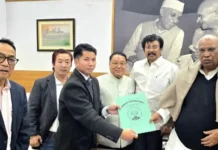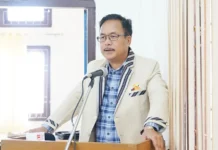DOIMUKH, 2 Jun: A webinar on the topic, ‘Traditional ecological knowledge and resource management’ was organized by the Fridays for Future-Arunachal Pradesh on Wednesday as a run-up to mark the World Environment Day-2021.
Over a 100 participants from across the country attended the session virtually.
Resource person Bengia Pappi, a PhD research scholar of the Rajiv Gandhi University’s sociology department stated that “traditional knowledge is tradition-based undisclosed information and all other tradition-based innovations and creations resulting from intellectual activity in the industrial, scientific, literary or artistic fields.”
Emphasizing on the benefits of the traditional ecological knowledge, she said, “It helps in grass-root understanding of the communities and their needs; basis for self sufficiency and self-determination for the community, and contributes to development and better policy decisions.”
“It helps us with climate change in an effective manner; protects the people and their culture; helps manage environment risk and helps tribal indigenous communities protect their intellectual property rights,” she added.
She stated that some common challenges faced by the tribal society of Arunachal today in terms of traditional ecological knowledge are due to the declining social legitimacy, including government support, lack of recognition of practices and practitioners, lack of self-esteem, erosion of knowledge, lack of successors, self-determination, rights to resources, traditional lands, ownership of knowledge and benefits from the use of resources and knowledge, intellectual appropriation challenges and other reasons.
“If traditional ecological knowledge diminution is a crisis, it can be solved by appropriate integration in formal learning, constant engagement on contemporary relevance and promotion as active social traditions in vital areas like agriculture, health etc,” she suggested.
Issues of integration of traditional ecological knowledge needs to be addressed at different social levels, such as communities, civil society groups, non-governmental organizations, formal and informal education institutions, local administrative structures and national and international multilateral and policy forums,” she added.



